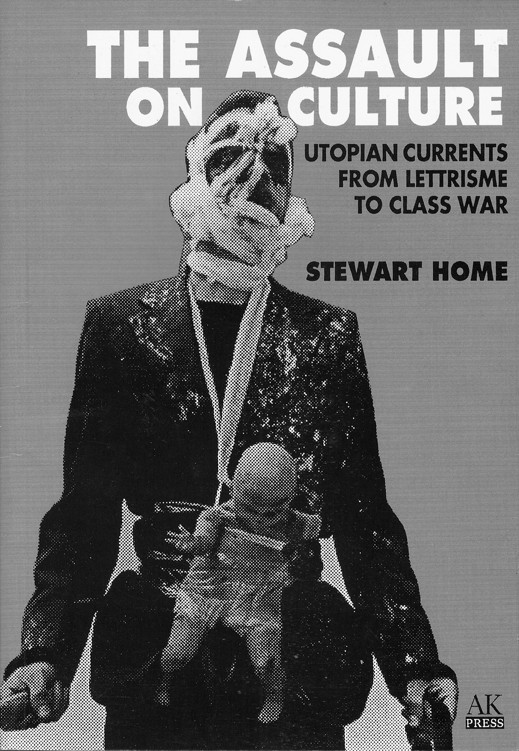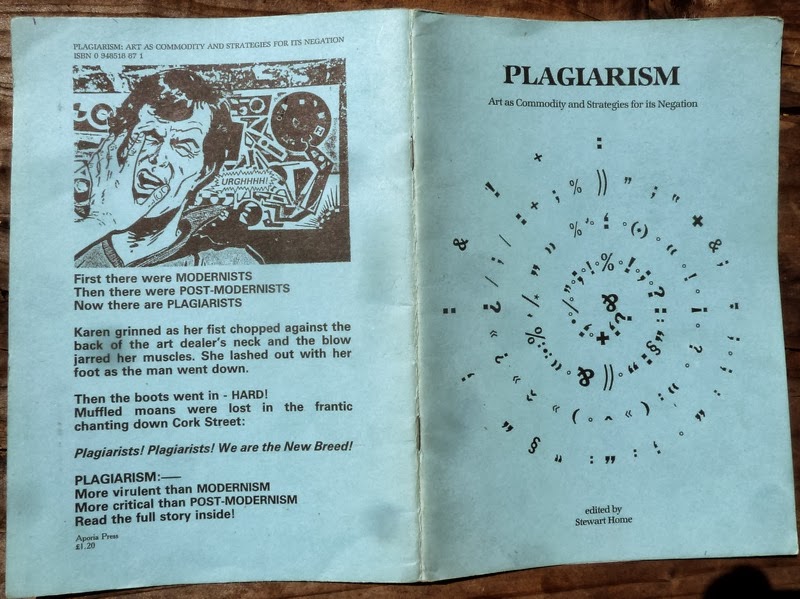Stewart Home: The Assault on Culture: Utopian Currents from Lettrisme to Class War (1988–) [EN, IT, ES]
Filed under book | Tags: · aesthetics, art, art history, avant-garde, fluxus, lettrism, mail art, neoism, pataphysics, punk, situationists

In The Assault on Culture, Stewart Home outlines the subterranean history of mid-to-late 20th century avant-gardes in which artistic and political vanguardism emerge as indissociable. In a comprehensive overview of relatively marginal movements—such as lettrism, situationism, and punk—Home analyzes these radical practices and experiences, which, due to their involvement in alternative forms of sociability as well as their relational, process-oriented, and political character, have remained at the margins of dominant art historiography. Home thereby establishes a critical rewriting of the neo avant-garde from a perspective that shares little with the paradigm of modernist formalism. (from MACBA)
First published by Aporia Press and Unpopular Books, London, 1988
Second UK edition, by AK Press, 1991
Review: Libero Andreotti (J Architectural Education, 1996).
Commentary: Not Bored! (1996, Home’s response)
The Assault on Culture (PDF), EPUB, HTML (from the author)
Assalto alla cultura (Italian, trans. Luther Blissett, 1996, unpaginated)
El asalto a la cultura (Spanish, trans. Jesus Carrillo and Jordi Claramonte, 2002)
See also Home’s Neoism, Plagiarism & Praxis, 1995.
Comment (0)Stewart Home: Neoism, Plagiarism & Praxis (1995)
Filed under book | Tags: · art, fluxus, neoism, plagiarism, retrofuturism

Neoism, Plagiarism & Praxis is concerned with what’s been happening at the cutting edge of culture since the demise of Fluxus and the Situationists. It provides inside information on the Neoists, Plagiarists, Art Strikers, London Psychogeographical Association, K Foundation, and other groups that are even more obscure.
Publisher AK Press, Edinburgh & San Francisco, 1995
ISBN 1873176333, 9781873176337
207 pages
via esco_bar
Stewart Home (ed.): Plagiarism: Art as Commodity and Strategies for its Negation (1987)
Filed under pamphlet | Tags: · art, neoism, plagiarism

“This is a pamphlet intended to accompany the debate that surrounds ‘The Festival Of Plagiarism’, but it may also be read and used separately from any specific event. It should not be viewed as a catalogue for the festival, as it contains opinions that bear no relation to those of a number of people participating in the event.
Presented here are a number of divergent views on the subjects of plagiarism, art and culture. One of the problems inherent in left opposition to dominant culture is that there is no agreement on the use of specific terms. Thus while some of the ‘essays’ contained here are antagonistic towards the concept of art — defined in terms of the culture of the ruling elite — others use the term in a less specific sense and are consequently less critical of it. Since the term ‘art’ is popularly associated with cults of ‘genius’ it would seem expedient to stick to the term ‘culture’ — in a non-elitist sense — when describing our own endeavours. Although culture as a category appears to be a ‘universal’ experience, none of its individual expressions meet such a criteria. This is the basis of our principle objection to art — it claims to be ‘universal’ when it is very clearly class based.
Hopefully this pamphlet, and the festival itself, will go some way towards demonstrating that there has been an opposition to art since the term took on its modern meaning in the eighteenth century.” (from the Introduction)
Publisher Aporia, London, 1987
ISBN 0948518871, 9780948518874
No copyright
30 pages
The Last Word: Art Strike, Word Strike, Plagiarism and Originality (by Mark Bloch)
Comment (0)
